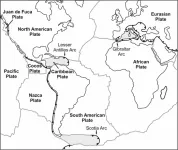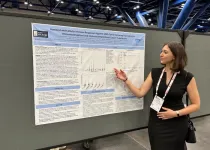(Press-News.org) With age, cells can experience senescence, a state where they stop growing but continue releasing inflammatory and tissue-degrading molecules. When a person is young, the immune system responds and eliminates senescent cells, often referred to as zombie cells. However, zombie cells linger and contribute to various age-related health problems and diseases. Mayo Clinic researchers, in two studies, shed light on the biology of aging cells.
In a study published in Aging Cell, Mayo Clinic researchers analyzed zombie cells to explain aging at the cellular level.
"We know people age at different rates and that a person's chronological age doesn't always match their biological age," says Jennifer St. Sauver, Ph.D., the lead author of the study and scientific director of the Population Health Science Scholars Program at Mayo Clinic's Robert D. and Patricia E. Kern Center for the Science of Health Care Delivery. "We found that a group of diverse proteins secreted by zombie cells can serve as biomarkers of senescence and can predict health outcomes in older adults. We also found that measuring these biomarkers in the blood can help predict mortality beyond the combination of a person's chronologic age, sex or presence of a chronic disease."
The study included 1,923 adults aged 65 and older with one health condition or none. The group included 1,066 women and 857 men, with 68% of study participants having no chronic conditions and 32% having one condition.
The researchers noted that the most common chronic conditions in the group were arthritis, high cholesterol and a history of cancer.
Researchers found that higher levels of specific senescent biomarkers, such as GDF15, VEGFA, PARC and MMP2, were all associated with an increased risk of death. Some of these biomarkers have been associated with developing chronic diseases. For example, research has shown that people with heart disease and some types of cancers have higher levels of GDF15 and VEGFA. Ongoing studies are investigating how lifestyle factors, including diet, physical activity and medications that appear to help clear senescent cells, influence the circulating levels of the biomarkers.
Uncovering unknown phenomenon in zombie cells
Mayo Clinic researcher Joao Passos, Ph.D., who also studies the biology of aging, sees his main purpose as working to enhance the vitality and health span—the period of life free from the consequences of disease and disability—in older people.
In a new study published in Nature, he, along with postdoctoral researcher Stella Victorelli, Ph.D., and a large interdisciplinary team of collaborators, uncovered a previously unknown phenomenon that occurs in zombie cells.
Mitochondria, the tiny powerhouses within a cell, are responsible for producing energy but also play a crucial role when a cell incurs excessive damage. They can initiate a self-destruct mechanism called apoptosis, which leads to a cell's death. Senescent cells, which do not die, are notorious for resisting apoptosis. These two processes, apoptosis and senescence, have often been regarded as opposite cell fates.
However, Dr. Passos, Dr. Victorelli and the team unexpectedly observed a small group of "rogue" mitochondria attempt to initiate apoptosis in senescent cells. When they do so, these mitochondria release their DNA into the cell's cytosol, the "soup" inside a cell. Mitochondria were once independent bacteria, so the cell perceives the mitochondrial DNA as foreign, which sparks inflammation that can damage tissues and lead to disease.
Furthermore, the researchers found that if they blocked this process in mice equivalent in age to a 70-year-old human, they could reduce tissue inflammation and significantly boost their health, including improving their strength, balance and bone structure.
The Mayo Clinic Robert D. and Patricia E. Kern Center for the Science of Health Care Delivery supported the Aging Cell study, and the Mayo Clinic Robert and Arlene Kogod Center on Aging supported the Nature study. For the full list of disclosures, authors and research funding, please see the studies.
For more information on the studies, go to Discovery's Edge.
END
Health and zombie cells in aging
2024-02-15
ELSE PRESS RELEASES FROM THIS DATE:
Early-stage subduction invasion
2024-02-15
Contributed by Arianna Soldati, GSA Science Communication Fellow
Our planet’s lithosphere is broken into several tectonic plates. Their configuration is ever-shifting, as supercontinents are assembled and broken up, and oceans form, grow, and then start to close in what is known as the Wilson cycle.
In the Wilson cycle, when a supercontinent like Pangea is broken up, an interior ocean is formed. In the case of Pangea, the interior ocean is the Atlantic. This ocean has a rift in the middle, and passive margins on the side, which means no seismic or volcanic activity occurs along its shores. Destined to keep expanding, an Atlantic-type ...
Targeting the transporter
2024-02-15
When an enemy invades, defenders are ferried to the site to neutralise the marauders. In the human body, a protein carrier called SPNS2 transports S1P molecules from endothelial cells to rally immune cell response in infected organs and tissues.
Using specially-developed nanobodies that bind to SPNS2 and enlarge the entire structure, the enlarged SPNS2 structure allows the S1P molecules to be viewed via cryogenic electron microscopy. Scientists from the Immunology Translational Research Programme at the Yong Loo Lin School of Medicine, ...
AERA announces 2024 Fellows
2024-02-15
WASHINGTON, February 15, 2024—The American Educational Research Association (AERA) has announced the selection of 24 exemplary scholars as 2024 AERA Fellows. The AERA Fellows Program honors scholars for their exceptional contributions to, and excellence in, education research. Nominated by their peers, the 2024 Fellows were selected by the Fellows Committee and approved by the AERA Council, the association’s elected governing body. They will be inducted during a ceremony at the 2024 Annual Meeting in Philadelphia on April 12. With this cohort, there will be a total of 762 AERA ...
Hackensack meridian health biologist-turned-med student publishes COVID-19 vaccine study
2024-02-15
First-year Hackensack Meridian School of Medicine (HMSOM) student Elizabeth Titova leveraged her background in phlebotomy and scientific research to publish a new clinical study around COVID-19 vaccination in Microbiology Spectrum, a peer-reviewed, open-access ASM Journal.
In her study, Titova found that while naturally stronger in immunocompetent individuals, the immunocompromised population—”especially cancer patients undergoing treatment”—still received a “robust immune response” from the vaccine, indicating protection against SARS-CoV-2.
This ...
Burnout: identifying people at risk
2024-02-15
It is not uncommon for people to “hit the wall” at work and experience burnout for short or long periods of time.
“We have found that approximately 13 per cent of Norwegian employees are at high risk of burnout,” says Leon De Beer, Associate Professor of Work and Organizational Psychology at the Norwegian University of Science and Technology (NTNU) Department of Psychology.
De Beer has contributed to a new study on burnout published in the Scandinavian Journal of Psychology with colleagues from the Healthy Workplaces research group.
They are working on a new tool that can identify people at risk of burnout. ...
Study reveals accelerated aging in women living with HIV
2024-02-15
Women with HIV experience accelerated DNA aging, a phenomenon that can lead to poor physical function, according to a study led by Stephanie Shiau, an assistant professor in the Department of Biostatistics and Epidemiology at the Rutgers School of Public Health.
Published in The Journal of Infectious Diseases, the study sheds light on the unique challenges faced by women with HIV as they age and opens avenues for tailored interventions to enhance health outcomes. Globally, over 50 percent of individuals living with HIV are ...
How parents can help prevent the development of ADHD symptoms
2024-02-15
Parents of young children with an excitable or exuberant temperament could adapt their parenting style to help moderate their child’s potential development of Attention Deficit/Hyperactivity Disorder (ADHD), according to a new study co-authored by a University of Waterloo researcher.
Developmental psychologists know that temperament, parenting, and the brain’s executive functions are interconnected factors in developing ADHD symptoms throughout childhood. But, the study found specific factors that predict a higher chance of ADHD symptoms, pointing to the importance ...
Meow or rooaaar - exotic cats' ability to recognize familiar caregivers' voices
2024-02-15
In a recent PeerJ Life & Environment study, Professor Jennifer Vonk from Oakland University presents compelling evidence that exotic cats possess the remarkable ability to discriminate between familiar and unfamiliar human voices.
The article - "Catcalls: Exotic Cats Discriminate the Voices of Familiar Caregivers" - delves into the often-overlooked realm of voice recognition among Felidae species. While much attention has been paid to domestication and early experiences in understanding animals' ability to differentiate between ...
Dementia researchers share recruitment strategies for pragmatic clinical trial
2024-02-15
WINSTON-SALEM, N.C. – Feb. 15, 2024 – According to the Alzheimer’s Association, more than 6.5 million Americans are living with Alzheimer’s disease, and 1 in 3 older adults will die with the disease or another form of dementia. There’s also a growing need for improved care and support, not only for persons living with dementia but also for their caregivers.
Underrepresented populations are disproportionally more likely to have Alzheimer’s disease compared to other Americans, so there’s ...
Mount Sinai named official medical service provider for International Sumo League
2024-02-15
For the first time, the Mount Sinai Health System has been named the official medical service provider for the International Sumo League—the world’s largest league of sumo wrestlers. Physicians from the Department of Rehabilitation and Human Performance are playing a key role in preparing the elite sumo wrestlers competing in international tournaments, including the upcoming World Championship Sumo at the Prudential Center in New Jersey on Sunday, February 18.
“We are excited to partner with International Sumo League and offer comprehensive care and expert guidance ...




